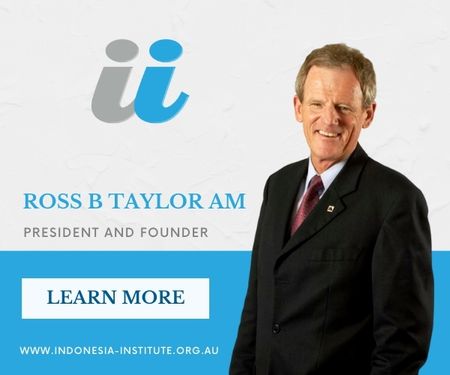By: Jack McMinigal
Summary
The relationship between Australia and Indonesia has always been important for both
nations, however, the history of its inception is not a widely known story in either country.
The years between 1945-1949, exemplify a relationship built using amity, respect, and
cooperation, such principles should continue to define Australian-Indonesian relations in the
future.
Australia and Indonesia 1945-1949, the Beginning of Relations Between Two Young
Nations. This year, on 17 August, marked the seventy-seventh anniversary of Indonesian
independence from Dutch rule, Indonesia’s national struggle was the first war for liberation
able to successfully expel a colonial regime in post-WWII Asia. It was also during this period that Australian-Indonesian relations began to develop, Australia only a young nation herself, strongly supported Indonesia’s push for independence. Thus, relations between both governments began to develop through amity and respect.
Nearly two months after Indonesian nationalists proclaimed independence from the
Netherlands, the Australian government sent a congregation of diplomats to meet with
President Sukarno, leader of the nationalist struggle and first president of independent
Indonesia. However, such a meeting was prohibited by occupying allied forces that had
taken control of the archipelago in the wake of the Japanese defeat.
The objective of such an occupancy in Indonesia and other parts of Southeast Asia was to hold territories to allow for a re-establishment of colonial control. The notion of a possible return to colonial rule was not something that sat well with Indonesian nationalists, who had been opposing the colonial regime for over twenty years. When the Dutch administration rejected Indonesia’s 1945 proclamation for independence and began a campaign to regain control of the archipelago, fighting between nationalist and colonial forces ensued, in a conflict now known as Indonesia’s war for independence.
The fighting that followed was brutal, the Indonesian government withdrew to central Java,
from where it launched guerrilla warfare operations against colonial forces. However, there
was also a diplomatic front to the war, whereby Indonesian officials acted to bolster support
for independence within the international community, namely, through the United Nations
(UN). The Australian Labor Government, led by Ben Chifley had already pledged its support
for Indonesia before the outbreak of violence. Such support continued throughout the
conflict, largely through Australian advocation for a peace agreement to be negotiated
through the UN and Indonesian freedom from colonial rule.
At the time, the developing conflict in Indonesia was a significant issue in Australian
politics, Australia had only just returned from fighting in a world war to protect its national
liberty. Thus, the conviction that self-determination was a rite shared by all, was firmly
embedded in the minds of many Australians.
The Japanese invasion of Southeast Asia forced the Netherland East Indies administration out of Indonesia, consequently, the Netherlands were allowed by the Australian government to temporarily move their colonial headquarters to Brisbane. Amongst the Dutch personnel in Australia were soldiers and sailors recruited from Indonesia, many of whom, after hearing of Sukarno’s proclamation of independence, refused to continue working for the Dutch administration. Many were incarcerated as political prisoners, although, this did not last long as Australian trade unions began to involve themselves in Indonesia’s independence struggle, lobbying the government for the release of Indonesian prisoners.
Furthermore, protesting a Dutch reoccupation of Indonesia, by refusing to work on Dutch vessels or allowing them to leave port with military equipment. Trade union black bans such as these were common throughout Australian ports between 1945-1949 and reflected Australian public support for Indonesian independence.
The Australian government was also directly involved in negotiating a final peace agreement between Indonesia and the Netherlands, which was finalised in December 1949. Australia was nominated by the Indonesian government as its representative in the UN good offices committee, additionally, made up of Belgium an appointed representative to the Netherlands, and the United States as a mediating party. Such negotiations, ultimately, led to Dutch recognition of Indonesian sovereignty as the United States of Indonesia and independence from the Dutch Empire.
The events discussed above focus on the origins of a relationship that has lasted seventyseven years. Throughout this time Australia and Indonesia have not always agreed with one another, however, a strong relationship has developed all the same. The period between 1945 and 1949, illustrates the nature of that relationship, forged by amity, respect, and cooperation. Hopefully moving forward, Australia and Indonesia will continue to develop their relationship using these same core principles.
The Indonesia Institute is delighted to share with all our members an article from our intern Jack McMinigal on the bilateral relationship between Australia and Indonesia. Jack is a student in his final semester at The University of Notre Dame Australia, where he is completing a double degree in International Relations and History.
Jack is passionate about international politics and diplomacy, holding the conviction that continuing to foster a relationship built on amity and respect between Indonesia and Australia is a beneficial way forward for both nations. Once he graduates, Jack wishes to pursue a career in his chosen disciplines, at some stage returning to further his studies.
The Indonesia Institute is proud to be able to provide opportunities to and mentor future leaders who are passionate about the bilateral relationship and we hope that you enjoy his article.
Bibliography
- Australian Embassy, Indonesia. “Australia and Indonesia.” Speech to Jakarta ForeignCorrespondents Club, by Gary Quinlan – Australian Ambassador to Indonesia, November27, 2019. https://indonesia.embassy.gov.au/jakt/AR19_003.html
- Baldino, Daniel, Andrew Carr, and Anthony J. Langlois. Australian Foreign Policy :Controversies and Debates. Edited by Daniel Baldino, Andrew Carr, and Anthony J.Langlois. South Melbourne, Vic: Oxford University Press, 2014.
- Church, Peter. A Short History of South-East Asia. New York: John Wiley & Sons,Incorporated, 2017.
- Dalziel, Alex. “75 years of ‘Black Armada’: Australian dockworkers defend Indonesia’sindependence in 1945.” The Jakarta Post, September 09, 2020.https://www.thejakartapost.com/life/2020/09/09/75-years-of-black-armada-australiandockworkers-defend-indonesias-independence-in-1945.html.
- National Archives of Australia. “Ben Chifley: during office.” Accessed September 13, 2022.https://www.naa.gov.au/explore-collection/australias-prime-ministers/ben-chifley/duringoffice
- Steedly, Mary Margaret. Rifle Reports: a Story of Indonesian Independence. 1st ed.Berkeley: University of California Press, 2013. https://doi.org/10.1525/j.ctt2jcbst.





